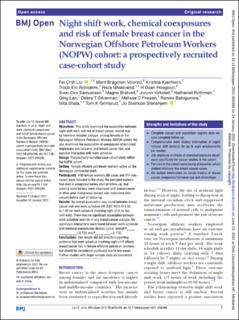| dc.contributor.author | Liu, Fei-Chih | |
| dc.contributor.author | Veierød, Marit Bragelien | |
| dc.contributor.author | Kjærheim, Kristina | |
| dc.contributor.author | Robsahm, Trude Eid | |
| dc.contributor.author | Ghiasvand, Reza | |
| dc.contributor.author | Hosgood, H Dean | |
| dc.contributor.author | Samuelsen, Sven Ove | |
| dc.contributor.author | Bråtveit, Magne | |
| dc.contributor.author | Kirkeleit, Jorunn | |
| dc.contributor.author | Rothman, Nathaniel | |
| dc.contributor.author | Lan, Qing | |
| dc.contributor.author | Silverman, Debra T | |
| dc.contributor.author | Friesen, Melissa C | |
| dc.contributor.author | Babigumira, Ronnie | |
| dc.contributor.author | Shala, Nita Kaupang | |
| dc.contributor.author | Grimsrud, Tom Kristian | |
| dc.contributor.author | Stenehjem, Jo S. | |
| dc.date.accessioned | 2022-06-29T10:45:32Z | |
| dc.date.available | 2022-06-29T10:45:32Z | |
| dc.date.created | 2022-05-12T14:47:26Z | |
| dc.date.issued | 2022 | |
| dc.identifier.issn | 2044-6055 | |
| dc.identifier.uri | https://hdl.handle.net/11250/3001519 | |
| dc.description.abstract | Objectives
This study examined the association between night shift work and risk of breast cancer, overall and by hormone receptor subtype, among females in the Norwegian Offshore Petroleum Workers (NOPW) cohort. We also examined the association of coexposure (chlorinated degreasers and benzene) and breast cancer risk, and possible interaction with work schedule.
Design
Prospectively recruited case-cohort study within the NOPW cohort.
Setting
Female offshore petroleum workers active on the Norwegian continental shelf.
Participants
600 female workers (86 cases and 514 non-cases) were included in the study. We excluded workers that died or emigrated before start of follow-up, had missing work history, were diagnosed with breast cancer or other prior malignancy (except non-melanoma skin cancer) before start of follow-up.
Results
No overall association was found between breast cancer risk and work schedule (HR 0.87, 95% CI 0.52 to 1.46 for work schedule involving night shift vs day shift only). There was no significant association between work schedule and risk of any breast cancer subtype. No significant interactions were found between work schedule and chemical coexposures (breast cancer overall Pinteraction chlorinated degreasers=0.725 and Pinteraction benzene=0.175).
Conclusions
Our results did not provide supporting evidence that work schedule involving night shift affects breast cancer risk in female offshore petroleum workers, but should be considered cautiously due to few cases. Further studies with larger sample sizes are warranted. | en_US |
| dc.language.iso | eng | en_US |
| dc.publisher | BMJ Publishing Group | en_US |
| dc.rights | Navngivelse 4.0 Internasjonal | * |
| dc.rights.uri | http://creativecommons.org/licenses/by/4.0/deed.no | * |
| dc.title | Night shift work, chemical coexposures and risk of female breast cancer in the Norwegian Offshore Petroleum Workers (NOPW) cohort: a prospectively recruited case-cohort study | en_US |
| dc.type | Journal article | en_US |
| dc.type | Peer reviewed | en_US |
| dc.description.version | publishedVersion | en_US |
| dc.rights.holder | Copyright Author(s) (or their employer(s)) 2022. | en_US |
| dc.source.articlenumber | e056396 | en_US |
| cristin.ispublished | true | |
| cristin.fulltext | original | |
| cristin.qualitycode | 1 | |
| dc.identifier.doi | 10.1136/bmjopen-2021-056396 | |
| dc.identifier.cristin | 2024008 | |
| dc.source.journal | BMJ Open | en_US |
| dc.identifier.citation | BMJ Open. 2022, 12 (1), e056396. | en_US |
| dc.source.volume | 12 | en_US |
| dc.source.issue | 1 | en_US |

